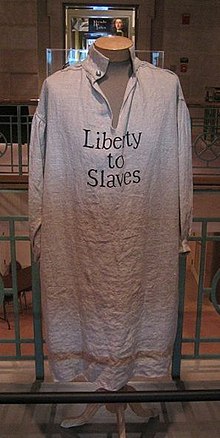
Back Lleialistes negres Catalan Lealista negro Spanish Loyaliste noir French Lealistas negros Portuguese Чёрные лоялисты Russian Britanya yanlısı siyahiler Turkish
| Black Loyalist | |
|---|---|
 Smock similar to those worn by Black Loyalist soldiers in Lord Dunmore's Ethiopian Regiment | |
| Active | 1775–1784 |
| Country | |
| Allegiance | |
| Branch | British provincial units, Loyalist militias, associators |
| Type | infantry, dragoons (mounted infantry), irregular, labor duty |
| Size | companies-regiments |
| Engagements | American Revolutionary War |
| Commanders | |
| Notable commanders | Both White British military officers and Black Loyalist officers |
Black Loyalists were people of African descent who sided with the Loyalists during the American Revolutionary War.[1] In particular, the term refers to men who escaped enslavement by Patriot masters and served on the Loyalist side because of the Crown's guarantee of freedom.
Some 3,000 Black Loyalists were evacuated from New York to Nova Scotia; they were individually listed in the Book of Negroes as the British gave them certificates of freedom and arranged for their transportation.[2] The Crown gave them land grants and supplies to help them resettle in Nova Scotia. Some of the European Loyalists who emigrated to Nova Scotia brought their enslaved servants with them, making for an uneasy society. One historian has argued that those slaves should not be regarded as Loyalists, as they had no choice in their fates.[3] Other Black Loyalists were evacuated to London or the Caribbean colonies.
Thousands of enslaved people escaped from plantations and fled to British lines, especially after British occupation of Charleston, South Carolina. When the British evacuated, they took many former enslaved people with them. Many ended up among London's Black Poor, with 4,000 resettled by the Sierra Leone Company to Freetown in Africa in 1787. Five years later, another 1,192 Black Loyalists from Nova Scotia chose to emigrate to Sierra Leone, becoming known as the Nova Scotian Settlers in the new British colony of Sierra Leone. Both waves of settlers became part of the Sierra Leone Creole people and the founders of the nation of Sierra Leone. Thomas Jefferson referred to the Black Loyalists as "the fugitives from these States".[4]
- ^ Cassandra Pybus, Epic Journeys of Freedom: Runaway Slaves of the American Revolution and Their Global Quest for Liberty, (Beacon Press, Boston, 2006); Graham Russell Hodges, Susan Hawkes Cook, Alan Edward Brown (eds), The Black Loyalist Directory: African Americans in Exile After the American Revolution (subscription required)
- ^ The Book of Negroes Archived 2022-07-30 at the Wayback Machine, Black Loyalists.
- ^ Barry Cahill, "The Black Loyalist Myth in Atlantic Canada", Acadiensis, University of New Brunswick
- ^ Jefferson, Thomas (1900). The Jeffersonian Cyclopedia. Funk & Wagnalls Company. p. 621 (#5808). Retrieved August 6, 2010.
© MMXXIII Rich X Search. We shall prevail. All rights reserved. Rich X Search